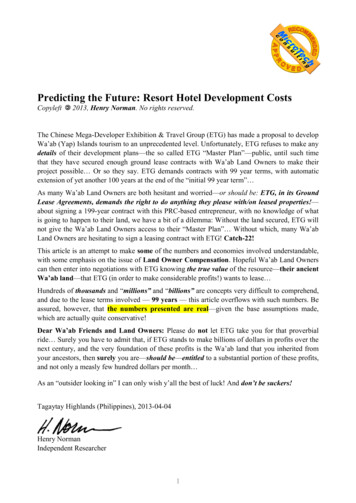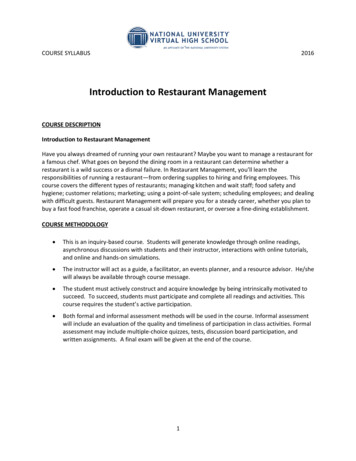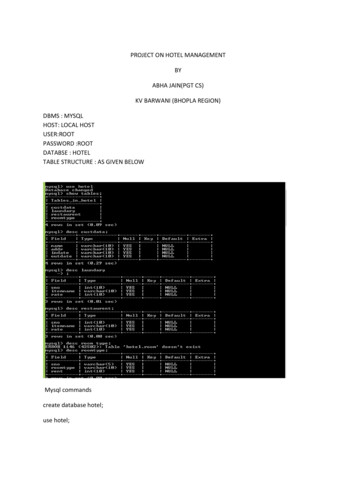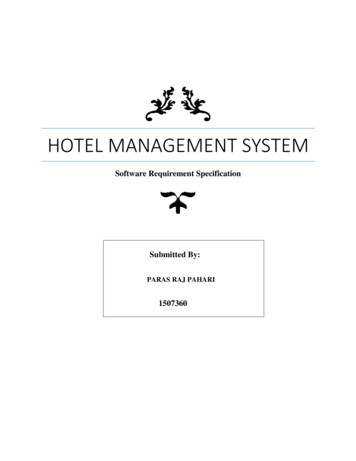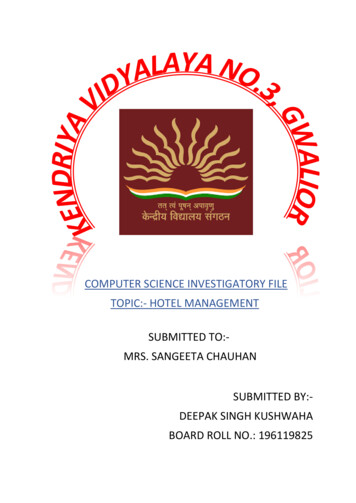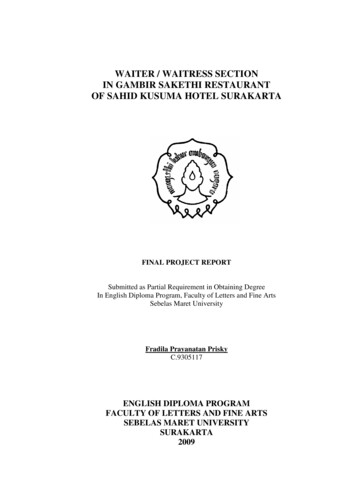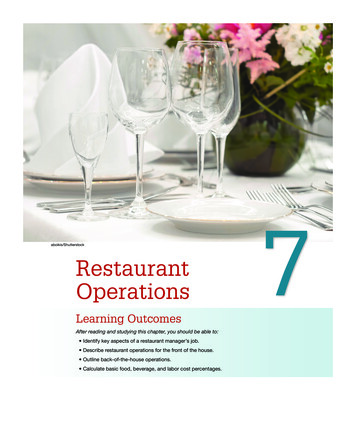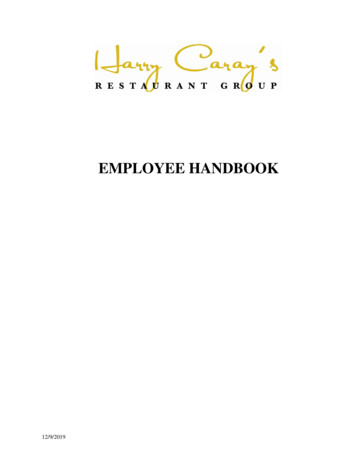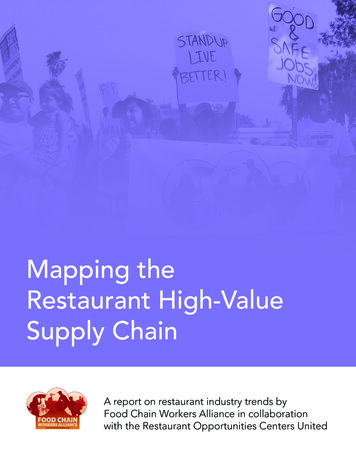
Transcription
THIS REPORT CONTAINS ASSESSMENTS OF COMMODITY AND TRADE ISSUES MADE BYUSDA STAFF AND NOT NECESSARILY STATEMENTS OF OFFICIAL U.S. GOVERNMENTPOLICYRequired Report - public distributionDate: 10/18/2018GAIN Report Number: TR8034TurkeyFood Service - Hotel Restaurant InstitutionalTurkey’s Tourism Industry is RecoveringApproved By:Christine Strossman, Agricultural CounselorPrepared By:Caglar Erdogan, Agricultural Marketing SpecialistReport Highlights:There has been an increase in incoming tourists in 2017 compared to 2016 when there were severalsecurity problems. Fast food restaurants have been performing better compared to full service and finedining outlets. There are approximately 140,000 food service outlets in Turkey in all segments. Theindustry is very fragmented with mostly small stand-alone restaurants. Five thousand institutional foodservice companies are serving corporations, hospitals, schools, universities, state and municipal offices,nursing homes, and some military bases, either via cooking in their own facilities and delivering thefood or cooking on customer premises.Post:Ankara
MARKET FACT SHEET: TURKEYExecutive SummaryThe Republic of Turkey has a young population of 80million people fueling consumption. It is in a CustomsUnion with the European Union (EU) and is the 17thlargest economy in the world. Annual GDP growth was7.4 percent in 2017 but 3.0 and 1.0 percent is forecast for2018 and 2019, respectively. Geopolitical challengescontinue simultaneously with increasing inflation and asignificant depreciation of the Turkish Lira over the pastyear. Nevertheless, there are opportunities in the foodsector.Food Service: Hotel, Restaurant & InstitutionalThere has been an increase in incoming tourists in 2017compared to 2016 when there were several securityproblems. Fast food restaurants have been performingbetter compared to full service and fine-dining outlets.There are approximately 140,000 food service outlets inTurkey in all segments. The industry is very fragmentedwith mostly small stand-alone restaurants. Five thousandinstitutional food service companies are servingcorporations, hospitals, schools, universities, state andmunicipal offices, nursing homes, and some militarybases, either via cooking in their own facilities anddelivering the food or cooking on customer premises.oriented products such as rice, dried beans, walnuts,almonds, bananas, coffee, cocoa, meat, fish and differentkinds of processed/packaged food items.Quick Facts on Turkey’s Food SectorConsumer Food Service, 2017US 12.2 billion (by retail sales prices)List of Top 10 (by market share in 2017) Foreign Fast FoodChain Brands in Turkey1. Burger King (USA)2. Mc Donald’s (USA)3. Popeye’s (USA)4. Kentucky Fried Chick. (USA)5. Subway (USA)6. Carl’s Jr. (USA)7. Arby’s (USA)8. Sbarro (USA)9. Krispy Kreme (USA)10. Duran Sandwiches (USA)List of Top 10 (by market share in 2017) Domestic Fast FoodChain Brands in Turkey1. Tavuk Dunyasi2. Oses Cigkofte3. Simit Sarayi4. Bay Doner5. Kofteci Ramiz6. Sultanahmet Koftecisi7. Usta Doner8. Komagene Cigkofte9. Kahta Cigkofte10. Bereket DonerTop 10 Retailers (by market share in 2017)1. Bim6. M- Jet (a Migros Brand)2. A 1017. Ekomini3. Migros8. Hakmar4. Şok9. Onur5. CarrefourSA10. YunusGDP/Population 2017Population: 80.1 millionGDP, PPP: US 2,133 billionGDP Per Capita, PPP: US 26,500Sources: CIA World Fact Book; Euromonitor International; TurkishStatistical Institute; Global Trade engthsWeaknessesSource: Euromonitor International. See Table 1 for data.Tourism Industry in TurkeyTourism is an important industry for Turkey. As of 20173.1 percent of the GDP and 16.7 percent of all exports arefrom tourism income. On the Mediterranean coast aroundthe province of Antalya, the coast line is full of allinclusive hotels in varying sizes and qualities withdifferent amenities. Due to the all-inclusive approach, therestaurant sector is not well-developed in that area, whichis mainly dominated by foreign tourists. On the otherhand, on the Aegean coast in several vacation resortswhere domestic tourists are the majority, hotels varybetween hostels to large-size luxury hotels. Food servicein these towns such as Bodrum, Datca, Cesme, Kas,Kusadasi is more developed than the Mediterranean coast.Business hotels can be found in large cities whereindustry and trade are well-developed.Imports of Consumer-Oriented Agricultural ProductsEU contries are the major suppliers of consumer-orientedagricultural products, with the advantage of proximity andthe Customs Union. Turkey imports some consumerSolid GDP and disposableincome growthDomestic andinternational politicalchallengesLarge population base: youngand growingEconomicinstabilities such asexchange ratefluctuationsOpportunitiesThreatsUnsaturated market, open fornew itemsComplex and timeconsuming importproceduresGrowing demand for highvalue packed food, ready toeat/cook meals as the share ofworking women increasesStrong traditionalfood and cuisineaffectingconsumption habitsSources: CIA World Fact Book; Euromonitor International;Turkish Statistical Institute, Economist Intelligence UnitContact: USDA FAS Ankara Office of Agricultural AffairsTelephone: 90 312 457 7393FOOD SERVICE: HOTEL, RESTAURANT, INSTITUTIONAL in TURKEY2
MARKET FACT SHEET: TURKEYE-mail: agankara@usda.govFOOD SERVICE: HOTEL, RESTAURANT, INSTITUTIONAL in TURKEY3
I. MARKET SUMMARYTurkey has registered the highest Gross Domestic Product (GDP) growth since 2013 with 7.4 percent annual realgrowth rate in 2017 after stagnation in 2016 caused by a series of terrorist attacks and an attempted coup againstthe Government of Turkey (GoT) in July 2016. The strong recovery in 2017 mostly depended on a short-termfiscal stimulus and an economic slowdown has been observed in 2018. The Economist Intelligence Unit forecastsabout 3 percent and 1 percent GDP growth for 2018 and 2019, respectively. The annual inflation rate has risen to24.52 percent as of September 2018 and the Turkish Lira (TL) has depreciated against major foreign currenciesquickly. The TL/USD exchange rate was 3.76 on January 2nd, 2018 and 5.98 TL/USD as of October 11, 2018.Tourism registered relatively a better performance in 2017 compared to 2016 when domestic security issuesnearly halted tourism. The real value of tourist receipts rose by 23.9% in 2017 after a steep fall the previous year.Gains of 3.8% are forecast for 2018 according to Euromonitor International (EMI). Russian tourists started tocome back to Turkey as a result of improved relations between the two countries. However incoming arrivalsfrom other European countries continue to stagnate even though it is getting cheaper for them to holiday inTurkey due to the depreciating TL against the Euro. The occupancy levels in hotels continued to be lowcompared to recent years. This led to a poor performance of food service through hotels, especially at holidayresorts in 2017. The composition of tourists in Istanbul has shifted from European to Middle Eastern tourists,from countries such as Iran, Saudi Arabia, Jordan, Iraq, Tunisia, and UAE. Russian, German and British touristsgenerally choose Antalya and surroundings for beach resorts, a major proportion of which are all-inclusive hotels.According to the GoT, there have been about 32 million foreign national entrants to Turkey in 2017, amongwhom a large number were from Germany. Due to the historical migration from Turkey to Germany, a portion ofGerman nationals visiting Turkey are second and third generation Turkish migrants to Germany carrying Germanpassports. Some of these may be considered tourists but the majority are in the country to visit friends and family.Table 1: Consumer Food Service Value, Number of Outlets and Number of TransactionsConsumer Food ServiceUnitValue by Retail Sales Price (RSP) USD (mill.) with y-o-y FX ratesValue by Retail Sales Price (RSP) USD (mill.) with 2017 fixed FX ratesNumber of OutletscountNumber of 8,7233,089Source: Euromonitor International.FOOD SERVICE: HOTEL, RESTAURANT, INSTITUTIONAL in TURKEY4201712,21312,213140,3543,078
Attempted coupin July 2016Russia puts travel restrictions onRussian citizens’ travel to TurkeySource: Turkish Border Police via Turkish Statistical Institute. Total number of entrants are shown on the right axis via the bars.The Turkish food service sector is large and highly fragmented; it can be divided into two categories ascommercial and institutional food service. Commercial food service consists of full-service restaurants, selfservice restaurants (mostly restaurants called esnaf lokantasi serving Turkish home-style cooking), fast-foodrestaurants, cafes/bars, home-delivery/takeaway outlets, street stalls/kiosks; serving approximately at 140,000locations throughout the country in 2017 according to EMI.Table 2: Number of Outlets per Type of FoodserviceNumber of OutletsFull Service RestaurantsCafes/BarsFast FoodStreet Stalls/KiosksSelf-Service Cafeterias100% Home Delivery/TakeawayTotal Consumer Food 791,0701,1701,2071,2651,280136,592 138,036 138,086 139,861 138,723 140,354Source: Euromonitor International.FOOD SERVICE: HOTEL, RESTAURANT, INSTITUTIONAL in TURKEY5
Source: Euromonitor International. Total retail sales value (RSP) is shown on the right axis via the bars. Year on Year exchange rates are used.Due to the changing profile of tourists and the economic difficulties in the country, with high food inflation ratesand the depreciating Turkish Lira, spending in full-service restaurants has declined. At the same time, theincreasing number of double income households with less time for cooking at home in this time of economicslowdown caused cheaper options such as fast food outlets, home delivery, and street stalls to become moreattractive. Consumers are expected to remain price-sensitive in the near term.During the last decade, foreign full-service restaurants/brands that entered the Turkish Market (including USorigin), such as El Torito, TGI Friday’s, Chili’s, Jamie Oliver, Tom’s Kitchen, Spice Market Hakkasan, Benihana,Armani Café, Ciprani, Bice, Nando’s, Laduree, De Silvano, Hard Rock Café, have since exited Turkey. Whilesome of these stayed for longer periods, such as TGI Friday’s, others exited after just a short trial period likeChili’s. Some others shrank their operations, decreasing their number of outlets down to a single one, such asZuma and P.F. Chang’s which each had two restaurants previously. Foreign cafés such as Paul’s and BaskinRobbin’s also left Turkey. Cheese Cake Factory has decided not to get into the market1 due to restrictions onsome ingredients. Turkey has not authorized use of any biotech products in food and maintains a zero tolerancepolicy. Many local fine dining restaurants also closed or reduced their number of outlets. This can be partlyattributed to the decreasing number of western tourists in large cities and shrinking purchasing power of theupper-middle class has caused these exits and cut-backs in the foreign chain restaurant brands and non-casual fullservice and especially fine-dining segment. On the other hand, foreign fast food chains such as McDonalds,Arby’s, Popeye’s etc. and café chains such as Starbucks continued expansion through opening more outlets in thelast decade, including over the last few years.There are also food service companies serving institutional needs since the late 1970s; these catering companiesserve corporate canteens, schools, hospitals, nursing homes, events in different venues, and more recently evensome military facilities. According to the Federation of Food Industrialist Associations (YESIDEF), there are1Hurriyet Daily Newspaper, June 23, 2016. Cheesecake Factory’e Turkiye Izini Cikmadi.FOOD SERVICE: HOTEL, RESTAURANT, INSTITUTIONAL in TURKEY6
5,000 companies in Turkey in the institutional food service field as of 2017 and this number has been pretty stablefor the last few years, with about an equal number of exits and entries from the industry. According to the sameFederation, the sales volume of these 5,000 firms is six billion USD annually in 2017. The size of thesecompanies varies significantly from small local firms to large international ones such as ISS, Sodexo. Thesecompanies either cook at their facilities and deliver the food to the respective institution or cook on the premisesof the institution. The institutional food service companies in general do not use imported ingredients except somebulk commodity agricultural items such as rice, pulses and vegetable oils.Table 2: Advantages & Challenges of the Turkish Food Service MarketADVANTAGESCHALLENGESLarge population base, approx. 80 million: young andgrowing; middle and upper middle classes are growing.Consumers are quality-conscious.Importing can be complex: Lack of transparency in rulesand regulations, time consuming import procedures, and azero tolerance for genetically engineered products oringredients for food use in TurkeyRecent strong and steady GDP growth, as well as more dualincome households, drives new demand for food service.especially fast-food, self-service food service and casualfull-service as well as home delivery/takeawayThe depreciation of the TL and high food inflation isincreasing the costs of restaurants and therefore less peopleare dining out -especially in full service and fine-diningvenues. Consumers are becoming more price-consciousWith many Turks traveling abroad compared to a decadeago, people are more aware of new cuisines and newingredientsThere is strong demand for local cuisine. Foreign restaurantbrands have faced difficulty succeeding in the market.Some local casual full-service restaurants are updating andimproving menus with new tastes every season. This is anopportunity for new ingredients to enter.There is misinformation among higher end consumers andbad publicity in the media about processed food ingredientsand additives.Source: Market observations of FAS Istanbul Office.II. ROAD MAP FOR MARKET ENTRYa. ENTRY STRATEGYAfter conducting market research determining that there is a potential market in Turkey for your productaddressing the needs of the HRI industry, it is important to develop a good strategy for market entry. Turkeystraddles southern European and Middle Eastern cultures, and relationships are very important for business. Thismakes already existing relations and connections in the country especially important. Finding a local agent is asafe approach for entry into the market, especially for medium and small enterprises that would like to startexporting to Turkey. Agents in Turkey are sometimes an importer, distributor, wholesaler, a commission-basedtrader or some combination thereof. Local representatives will have experience in market development andcontact information of potential buyers, such as the food processors that are likely to use your products. A goodrepresentative can guide you in the market, including on import rules and regulations, which ports to utilize, localbusiness practices, conducting market intelligence formally or informally, starting sales calls, etc. Beforeselecting any local agent, personally visiting them in Turkey is highly recommended. One should do meetingswith several of them before selecting one. For larger companies with more resources, it might be an option toestablish a company in Turkey and hire some local personnel.Import procedures are complicated and burdensome in Turkey2. This makes a local business ally more essential.For details on the requirements, please refer to our Exporters Guide to Turkey and FAS Turkey reports on Foodand Agricultural Import Regulations and Standards and Required Certificates. The U.S. Foreign CommercialService also gives some general information on import procedures to Turkey, and on doing business in Turkey.2FINAL IMPORT APPROVAL OF ANY PRODUCT IS SUBJECT TO THE IMPORTING COUNTRY'S RULES AND REGULATIONS ASINTERPRETED BY BORDER OFFICIALS AT THE TIME OF PRODUCT ENTRY. Please verify the whole set of import requirementswith the customer and officials.FOOD SERVICE: HOTEL, RESTAURANT, INSTITUTIONAL in TURKEY7
Local agent companies typically attend large shows such as Anuga in Germany, Sial in France, or Gulf Food inDubai. Food trade shows in Turkey can be helpful to visit before deciding to enter the market. Anfas FoodProduct, World Food Istanbul, IbaTech and Food Ingredients Fi Istanbul are good shows to visit and meetimporters. Travel Turkey Izmir Expo and Eastern Mediterranean International Tourism & Travel Exhibition aretwo local tourism related exhibitions.Entering the Turkish market often requires a long-term perspective and persistence, as building trust is important.Correct market analysis must be done thoroughly before entry. Turkey is a large country and has a very diverseset of consumers and food processing entities. We recommend reviewing our other reports and contacting theFAS Turkey office with any questions.b. MARKET STRUCTURE & DISTRIBUTIONThere is a large, diverse and fragmentedHRI sector in Turkey. The majority of thehotels and resorts are on the south andwest coasts of Turkey and in large cities,but other cities have facilities too. Importprocedures and reaching the diversecustomer base is hard for an Americancompany from a distant base, therefore alocal agent is recommended. The HRISector is known to buy imported foodstuffs from local representativecompanies as it is much easier for them compared to importing it themselves. Less commonly, some smaller HRIfacilities, such as small restaurants might buy their needs from a cash & carry or a retailer which buys theimported food from the representative company. In some cases, a wholesaler company, for example one that isdistributing food items to hotels, might purchase the imported food items from a representative company and sellto the HRI sector.c. SUB-SECTOR PROFILESImportant HRI companies in Turkey are listed below by sector, with links to their websites. Please note that theHRI industry is very large and fragmented in Turkey and most of the restaurants and hotels are standalone. Theimportant chains are listed below, but the list is by no means complete.Fast nald’s TurkeyBurger King TurkeyArby’s TurkeyKentucky Fried Chicken TurkeyPopeye TurkeyCarl’s Jr. TurkeySubway TurkeyBereket DonerBay DonerUsta DonerciTavuk DunyasiKofteci RamizSultanahmet KoftecisiKasap DonerEtiler MarmarisKomageneKahta Cigkofte18. Simit Sarayi19. Sbarro TurkeyPizza Chains1. Pizza Hut2. Papa John’s3. Domino’s4. Little Cesare’s5. Pizza Pizza6. Bafetto7. Pizza Bulls8. Panino Pizza9. Pasaport Pizza10. Pizza House11. Pizza Raffaele12. Tadim Pizza13. Sampi Pide (Turkish style pizza, local conceptvery similar to pizza)14. Neli Pide (Turkish style)FOOD SERVICE: HOTEL, RESTAURANT, INSTITUTIONAL in TURKEY8
15. Bafra Bide (Turkish style)16. Citir Usta (Turkish style)Full Service Restaurants1. Big Chefs (Casual)2. Mid Point (Casual)3. Kitchenette (Casual)4. The House Café (Casual)5. SushiCo (Casual)6. Eataly Turkey (Casual)7. Mezalluna (Non-casual)8. Paper Moon Turkey (Non-casual)9. Nusret (Casual, Steak)10. Gunaydin Et (Kebap, Steak)11. Kosebasi Kebap12. Develi Kebap13. Kasibeyaz Kebap14. Gelik (Kebap)15. Tike (Kebap)16. Hamdi KebapCoffee Shops1. Starbucks Turkey2. Kahve Dunyasi3. Caffé Nero4. Tchibo5. Caribou Turkey6. Gloria Jean’s Turkey7. Barnie’s Coffee & Tea Turkey8. Lavazza Turkey9. Kahveci Hacibaba10. Gonul Kahvesi11. Kahve Duragi12. Kahve Diyari13. Kahve Deryasi14. The Espresso Lab15. Bayramefendi Osmanli Kahvecisi16. Kocatepe Kahve EviHotels & Resorts1. Hilton Turkey2. Marriott Turkey3. Best Western Turkey4. Radisson Blu Turkey5. Holiday Inn Turkey6. Dedeman Hotels7. Rixos Hotels8. Marmara Hotels9. Kempinski Hotels Turkey10. Swiss Otel Turkey11. Wyndham Hotels Turkey12. Four Seasons Hotels13. Club Med Turkey14. Movenpick Hotel Turkey15. Voyage Hotels16. Divan Hotels17. Anemon Hotels18. Accor Hotels Turkey19. Crown Plaza Hotels20. Intercontinental HotelsInstitutional Food Service1. Sodexo Turkey2. ISS Turkey3. Sofra4. Sardunya5. Martas6. Keyveni7. Basak8. Polesan9. Uc Ogun Catering10. Bortar11. Tadin YemekFOOD SERVICE: HOTEL, RESTAURANT, INSTITUTIONAL in TURKEY9
Table 3: Number of Accommodation Facilities per Type (registered with the Ministry of Tourism***)With Tourism InvestmentLicense*Facility TypeHotelsHoliday VillagesThermal HotelsBed & BreakfastApartment HotelsBoutique HotelsSpecial Purpose Tourism FacilitiesComplex Tourism FacilityOthers**TOTALClassification Facilities Rooms5 Stars4 Stars3 Stars1 & 2 StarsTotal1. Class2. ClassTotal5 Stars4 Stars3 66 48,395 105,324253 31,892 66,885291 15,898 32,0741152,5755,191825 98,760 209,474184,0508,933164,169 10,270348,219 19,203166,717 14,667111,2812,70854731,147328,471 4251,0753,4611,051 122,228 263,033With Tourism OperationLicenseFacilities 3537,07722,2656,6687,249935,286* Facilities with Tourism Investment License from the Ministry of Tourism are either under investment stage or are in trial stage(operating) before they can get the Tourism Operation License.** Others include thermal apartment hotels, camping, golf facilities, type B holiday compounds, boutique villas, mountain houses, ranchhouses/village houses, hostels, plateau houses, rural huts.*** Many small accommodation types such as bed and breakfasts (called pansiyon in Turkish) are not registered with the Ministry ofTourism but they work with a license from the local Municipalities.III.COMPETITIONAccording to Post’s market observations, local processed food and agricultural products are the main competitorfor U.S. origin processed food and agricultural products that would go into the Food Service Industry: Hotels,Restaurants & Institutional. Turkey has a well-developed food processing sector that is producing good qualityfood items for the Turkish market and to export overseas. There is also a diverse production of a variety ofagricultural products such as fruits, vegetables, tree nuts, grain, pulses, poultry, dairy, fish and meat. Despite thefertile and diverse production base, demand in Turkey is above the supply for many agricultural items, thereforethe country has imports in all of the above-mentioned items except fruits (other than exotic fruits), vegetables andpoultry.In addition to local production, products from European countries are also important, especially for processedfood and processed food ingredients but also for meat and fish. EU has a customs union with Turkey where manyEuropean food items have low or no customs tariffs to Turkey. Furthermore, proximity is a major benefit forlower freight and shorter delivery times from Europe. Trucks are often used for transportation between Europeand Turkey. European Free Trade Association (EFTA) countries (Switzerland, Norway, Iceland, andLiechtenstein), also have a joint Free Trade Agreement (FTA) with Turkey, giving them preferential customsadvantages as well. In addition, Turkey has FTAs with 19 other countries, with many including preferential tariffrates on food and agriculture products. In consumer oriented agricultural products imports to Turkey (notincluding bulk products such as rice and pulses), four out of top five countries were EU countries. AfterNetherlands and Germany, the United States was the third largest supplier, followed by Poland and Italy in 2017.FOOD SERVICE: HOTEL, RESTAURANT, INSTITUTIONAL in TURKEY10
Please refer to our Retail Foods and Food Processing Ingredients reports for more detailed numbers on consumeroriented agricultural goods and processed products/ingredients exporting countries to Turkey. You can check ourfull set of reports for other agricultural commodities.IV.BEST PRODUCT PROSPECTS CATEGORIESTurkey is a highly competitive and very price sensitive market for many items. A thorough analysis should bedone before prospective exporters consider Turkey as a long term market. Exporters should be sensitive in brandpositioning and be prepared for sufficient marketing activities and advertising. Note that some products from theUnited States currently face additional tariffs, which affects competitiveness.a. PRODUCTS PRESENT in the MARKET WHICH HAVE GOOD SALES POTENTIAL1.2.3.4.5.6.7.8.9.10.11.12.Nuts: almonds, walnutsRicePulsesSunflower seed (for oil and confectionary)SaucesFunctional foodGourmet/Ethnic food ingredientsSpices (some niche spices)Dates, Cranberries and Dried FruitsBeer, Wine, Whiskey, Bourbon, other alcoholic drinksNon-alcoholic beveragesFood additives, food processing aids (especially innovative new ones)b. PRODUCTS NOT PRESENT in the MARKET BUT WHICH HAVE GOOD SALES POTENTIAL1.2.3.4.PecansOrganic processed foodOrganic coffee and different varieties of specialized coffeeSome dairy products like specialized cheesec. PRODUCTS NOT PRESENT in the MARKET BECAUSE THEY FACE SIGNIFICANT BARRIERS1. Food Items, ingredients from Genetic Engineered Crops (Please see Turkey Agricultural BiotechnologyAnnual Report 2017)2. Organic sugar3. Beef and productsV. KEY CONTACTS AND FURTHER INFORMATIONRepublic of Turkey, Ministry of Agriculture and Forestry (MinAF)Federation of All Food and Drink Industry Associations of Turkey (TGDF)Federation of Food Industrialists Associations (YESIDEF)All Foods Foreign Trade Association (TUGIDER)Turkish Restaurant and Entertainment Association (TURYID)Istanbul Food Industrialists Association (IYSAD)Out of House Consumption Association (ETUDER)Turkish Tourism Investors Association (TTYD)Hotel Association of Turkey (TUROB)Turkish Small Hotels AssociationAll Restaurants and Restaurant Suppliers Association (TURES)Association of Turkish Travel Agencies (TURSAB)FOOD SERVICE: HOTEL, RESTAURANT, INSTITUTIONAL in TURKEY11
Turkish Statistics Institute (TurkStat)Union of Chambers and Commodity Exchanges of Turkey (TOBB)Foreign Economic Relations Board of Turkey (DEIK)Investment Support and Promotion Agency of Turkey (ISPAT)For other agricultural industry reports on Turkey and other countries in the world you may visit ForeignAgricultural Service (FAS) webpage. Contact our office via the information below:Office of Agricultural AffairsUnites States Department of AgricultureU.S. Embassy Ankara110 Ataturk Bulvari, Kavaklidere, 06100Ankara, TurkeyTelephone: 90 312 457 7393E-mail: agankara@usda.govOffice of Agricultural AffairsUnites States Department of AgricultureU.S. Consulate General IstanbulUcsehitler Sokak No:2, Istinye, 34460Istanbul, TurkeyTelephone: 90 212 335 9068E-mail: agistanbul@usda.govFOOD SERVICE: HOTEL, RESTAURANT, INSTITUTIONAL in TURKEY12
Oct 18, 2018 · Source: Euromonitor International. See Table 1 for data. Tourism Industry in Turkey Tourism is an important industry for Turkey. As of 2017 3.1 percent of the GDP and 16.7 percent of all exports are from tourism income. On the Mediterranean coast aroun
